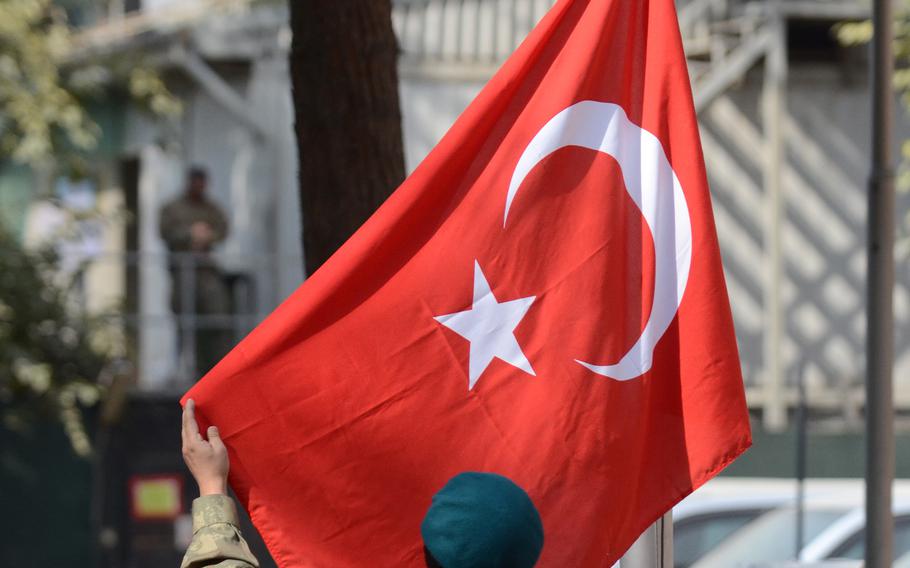
Turkey’s Foreign Ministry called Israeli criticism this week “provocative,” “aggressive” and “expansionist,” and urged Israel to “cease undermining the efforts to stabilize Syria.” (Richard Andrade/International Security Assistance Force HQ Public Affairs)
ISTANBUL - Israeli strikes in Syria over the past two days have opened a new flash point in the Middle East as Israel increasingly appears to take aim at Turkish interests in Syria.
Israel struck several targets on Wednesday night, including military bases in Hama and Homs in western central Syria, the Israel Defense Forces said. Turkey, a NATO member state and key ally of Syrian interim President Ahmed al-Sharaa, has shown an interest in a military footprint in Syria.
Syrian state news agency Sana reported that the strikes on Wednesday night targeted five different areas of Syria and resulted in injuries and the “near-total destruction” of Hama Military Airport. At least nine people were killed in a strike in southwestern Syria, the news agency said, citing local officials.
While Israel has struck other targets in Syria in recent months, this week’s attacks marked an escalation in tensions between two key regional players that have both sought to gain political leverage from the turmoil in Syria.
Israel’s Foreign Minister Gideon Saar on Thursday accused Turkey of “doing their utmost to have Syria as a Turkish protectorate.” Turkey has publicly signaled in the past that it is willing to take on a greater role in Syria. After a regional meeting in early last month, its Defense Ministry said that “in line with the demands of the new Syrian government, Turkey continues to evaluate the establishment of bases for training purposes.” It did not specify where these bases could be located - however, both Hama and Homs are locations that could host foreign troops.
Turkey’s Foreign Ministry called Israeli criticism this week “provocative,” “aggressive” and “expansionist,” and urged Israel to “cease undermining the efforts to stabilize Syria.”
Since the fall of Bashar al-Assad’s regime, Israel has carried out operations deep into southern Syria, bombarded military bases and taken control of a demilitarized United Nations-patrolled buffer zone on the Syrian side of its border, citing security concerns. The Israeli strikes that killed nine people this week hit near the Israeli-Syrian border, where locals had reported clashes with Israeli forces.
Turkey was seen as one of the biggest geopolitical winners when Sharaa-led militants stormed the Syrian capital of Damascus in December, ousting Assad and shocking his Russian and Iranian allies.
Before Assad’s fall, Turkey had supported various militant groups in Syria, including factions that have fought against U.S.-backed Kurdish forces and that participated in last year’s offensive that toppled Assad.
Now, Turkey has numerous incentives to help stabilize the interim Syrian government. Ankara hopes to speed up the return of millions of Syrian refugees at a time when Turkey’s weak economy has emerged as a key political issue, and Turkish businessmen have in recent months scouted Syria for investment opportunities.
Islamic State militants operating in Syria also continue to pose a threat both to Syrian and Turkish targets, and a weak Syrian central government could give rise to calls for Kurdish independence in Syria - a demand Turkey has been particularly determined to suppress.
Syria’s interim government has made some progress at reining in tensions with Kurdish-led forces. Governmental and Kurdish-led forces exchanged prisoners this week, Sana reported, potentially paving the way for more extensive talks between both sides.
But the government around Sharaa has struggled to quell other conflicts. In the wake of coordinated attacks on its security forces, militant groups affiliated with the government deliberately targeted members of the country’s Alawite minority in early March, killing more than 100 people in the coastal city of Baniyas alone, Amnesty International found in an investigation that it published on Thursday.
The attacks fed regional doubts over Sharaa. In neighboring Israel, some worry that an emboldened Syrian interim government could also curtail Israel’s military options.
Israeli officials view Sharaa as a “wolf in sheep’s clothing,” Yoni Ben-Menachem, a researcher at the Jerusalem Center for Security and Foreign Affairs, wrote in an analysis last month.
He “presents himself as a moderate while remaining a jihadist with an unchanged ideology, now seeking to consolidate power with Turkey’s backing,” he said, summarizing Israeli officials’ thinking.
But Israel’s strikes in Syria this week could backfire, cautioned Omer Ozkizilcik, a Turkey-focused nonresident fellow with the Atlantic Council. In neighboring countries, they are likely to boost Ankara’s arguments that a Turkish military presence could be useful.
“Turkey and Israel by themselves are very unlikely to resolve this,” he said. “It needs American mediation to find a security mechanism or arrangement between both sides.” Loveday Morris in Berlin and Beril Eski in Istanbul contributed to this report.